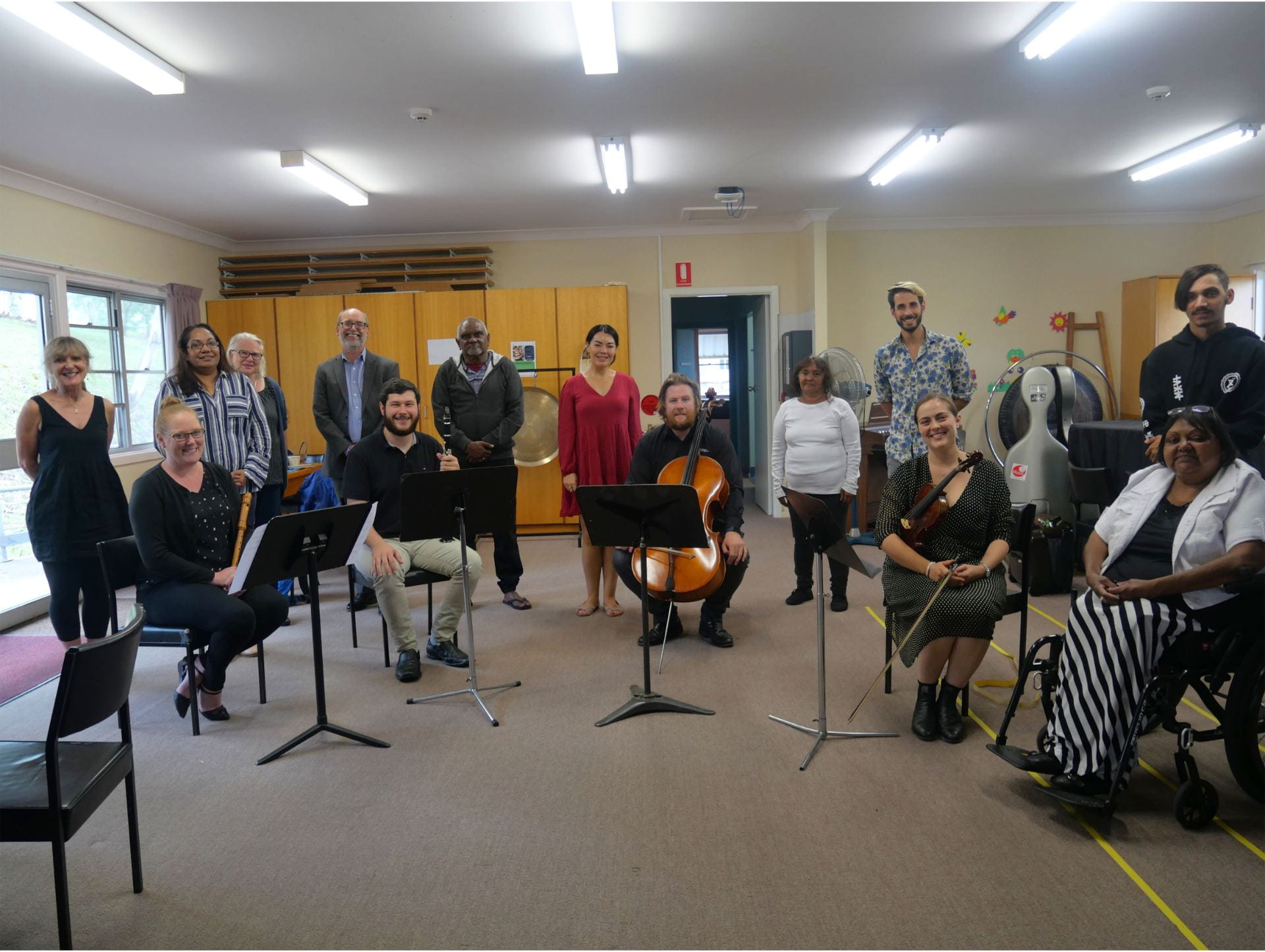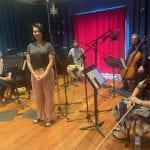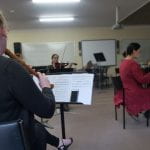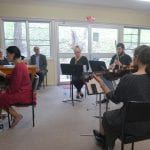Image: Back row- Dr Julie Collins, Dr Lorina Barker, Phillipa Trelford, Prof Mike Wilmore, Uncle Rick Elwood, Wiradjuri Soprano Georgina Hall, aunty Rebecca McKellar, Dr Paul Smith, Rick McKellar junior, Aunty Louise Elwood (seated); Front row- Dr Alana Blackburn, James McKay , Robert Jackson, Eliza Scott.
A collaborative composition project at UNE is bringing emotive musical meaning to UNE’s Reconciliation Action Plan (RAP). A musical composition commissioned by the Vice Chancellor of UNE has been underway since late 2020, and the composition was recently played and recorded for the first time.
This project has been a collaboration between Dr Lorina Barker, Dr Paul Smith, Aboriginal Elders, Wiradjuri soprano Georgina Hall and local Armidale musicians.
Beyond its significance to the RAP, the composition is an effective demonstration and an act of collaboration between members of the university and Aboriginal Elders from Bourke creating a piece of music that tells a story of removal.
The composition is based on two poems by Dr Lorina Barker, Senior Lecturer at UNE, about her grandmother – who was displaced from her Country and moved across NSW. The words of the original poem have now found new expression as a piece of classical music.
“This story started with a yarn with my Nan about her life and it turned into two short poems which are the original pieces,” says Lorina. “The poems turned into a short documentary about her life and the story removal of the Wangkumara. From that it became a small community exhibition which became the prototype for a larger project called ‘Looking Through Windows.’” The poems were then transformed into the one-act immersive theatre, Trucked Off, and performed at the Looking Through Windows exhibition opening. Prior to the recent recording of the song into a piece of classical music, several workshops via Zoom and a face-to-face rehearsal session were held for local Aboriginal Elders to guide, hear and provide feedback.
“To have your grandmother and your family members’ stories told in music and sung by a beautiful voice that carries the story, it is really hard to find words to express what it means,” said Lorina.
Aunty Rebecca McKellar also noted after hearing it that the song means a lot to her. “To tell my mum’s story, to go back to where she was born in Tibooburra, it is very emotional. It would mean a lot to perform this back at Tibooburra and take family members back.”
The sentiment of wanting to take the story home to Wangkumara Country is one shared by Lorina, who hopes the piece of music could be performed at a larger scale in her grandmother’s Country.
“To be able to perform it on Country and take everyone out to Tibooburra and perform it, it’s not impossible I think. We’ve already shown that the story can bring people together.”
The story of this song is very personal to Lorina, her family and the community, and as such it was decided that it needed an Indigenous voice, which is how Wiradjuri woman Georgina Hall joined the project as the soprano singer, adding an operatic element.
“We requested that the singer be Indigenous and we got Georgina. We are really pleased to have her here,” said Lorina.
The story and its emotional power resonated with Georgina, not only as the operatic singer of the piece, but as someone who has experienced the kind of trauma explored by the song.
“It is an absolute honour,” Georgina said. “When I read the text the first thing I felt was the first line ‘Do you need to know Country for Country to know you.’ My father’s family were displaced and my father’s generation didn’t know that they were Wiradjuri, or Aboriginal at all. So I didn’t grow up in Wiradjuri Country and to hear that line, it meant so much to me. It makes me feel like I belong somewhere.”
Also present for the rehearsal of the piece were UNE’s Deputy Vice-Chancellor Professor Michael Wilmore and UNE Lecturer in Music Dr Paul Smith, who worked with Aboriginal Elders and Lorina to compose the piece.
“This was the first time I had heard it entirely,” Paul noted. “It was only in my head or in the conversations we had been having, it hadn’t been fully realised until now. It is a special moment to hear it for the first time.”
Professor Wilmore also felt the emotional resonance and power of the song, describing it as an incredibly moving piece of music. “The lyrics are incredibly powerful, especially knowing that they have come out of the extensive experience that Lorina Barker has had exploring her own history and working with the Aboriginal Elders that collaborated with her and now continue to collaborate with her on this project.”
“It is a really important part of the mission of the university that we are using our ability to provide that support to allow important stories, like the ones we are hearing being told through this new musical composition. They are stories to be shared and remembered.”
- Georgina and the musicians at Beechwood Studios, photo by Julie Collins
- Dr Alana Blackburn and Georgina Hall during the rehearsal of the composition
- The band performing the composition in its entirety for the first time during rehearsal






Recent Comments